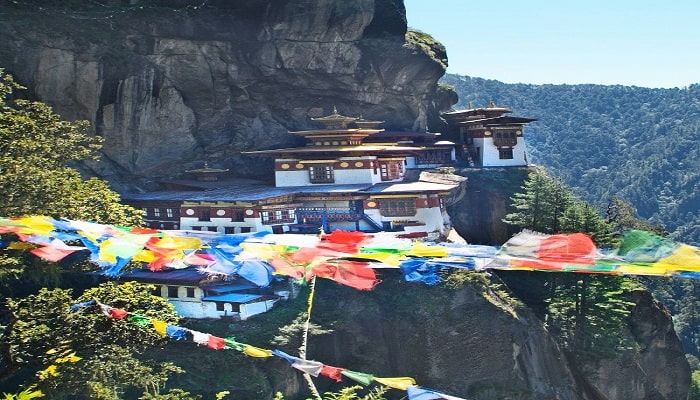Bhutan, known for its pristine landscapes and rich cultural heritage, is a pioneer in sustainable tourism. The country’s commitment to environmental conservation and cultural preservation makes it an ideal destination for eco-conscious travelers. To make the most of your trip while minimizing your environmental impact, it’s essential to follow sustainable travel practices.
For a comprehensive and eco-friendly travel experience, consider our Bhutan tour package from Kolkata, designed to ensure that your visit aligns with Bhutan’s sustainability goals. Here are some tips on how to travel sustainably in Bhutan.
1. Respect Bhutan’s Tourism Policy
Bhutan’s “High Value, Low Impact” tourism policy is designed to protect its environment and culture. This policy requires tourists (except citizens of India, Bangladesh, and the Maldives) to book their trips through licensed Bhutanese tour operators. The daily tariff set by the government includes accommodation, meals, transportation, and a licensed guide, ensuring that tourism benefits the local economy and minimizes environmental impact.
Key Points:
- Book through licensed tour operators.
- Understand and respect the daily tariff system.
- Support local businesses and communities.
2. Minimize Waste
To help keep Bhutan’s environment clean, aim to minimize your waste. Bring reusable items such as water bottles, shopping bags, and utensils to reduce single-use plastics. Dispose of waste properly and participate in local recycling initiatives whenever possible.
Tips:
- Carry a reusable water bottle.
- Use reusable shopping bags.
- Avoid single-use plastics.
3. Respect Local Culture and Traditions
Bhutanese culture is deeply rooted in Buddhism, and respect for local customs and traditions is paramount. Dress modestly, especially when visiting religious sites, and always ask for permission before taking photographs of people or their property. Participate in cultural activities and festivals to support the preservation of Bhutanese traditions.
Tips:
- Dress appropriately and modestly.
- Ask for permission before taking photos.
- Engage in and support local cultural activities.
4. Choose Eco-Friendly Accommodations
Many hotels and guesthouses in Bhutan are committed to sustainable practices. Choose accommodations that implement eco-friendly measures such as solar energy, water conservation, and waste management. Staying in eco-friendly lodges and homestays also supports local communities and reduces your environmental footprint.
Tips:
- Research and book eco-friendly accommodations.
- Support local homestays and community-based tourism.
- Look for hotels with sustainable certifications.
5. Conserve Water and Energy
Water and energy conservation are crucial in maintaining Bhutan’s environmental sustainability. Be mindful of your water usage by taking shorter showers and reusing towels. Turn off lights, air conditioning, and other electrical devices when not in use to conserve energy.
Tips:
- Take shorter showers and reuse towels.
- Turn off lights and electrical devices when not in use.
- Use energy-efficient practices whenever possible.
6. Support Local Crafts and Products
Purchasing local crafts and products not only provides you with unique souvenirs but also supports Bhutanese artisans and the local economy. Look for handmade textiles, thangka paintings, and other traditional crafts that reflect Bhutan’s rich cultural heritage.
Tips:
- Buy handmade and locally produced items.
- Avoid products made from endangered species.
- Support fair trade and ethical businesses.
7. Participate in Responsible Wildlife Tourism
Bhutan is home to diverse wildlife and pristine natural habitats. Engage in wildlife tourism responsibly by choosing tours and activities that prioritize conservation and animal welfare. Avoid activities that exploit or harm animals and opt for eco-friendly wildlife tours and treks.
Tips:
- Choose wildlife tours that prioritize conservation.
- Avoid activities that exploit or harm animals.
- Respect wildlife and their habitats.
8. Use Sustainable Transportation
To reduce your carbon footprint, use sustainable modes of transportation whenever possible. Bhutan’s well-maintained trekking routes are a great way to explore the country on foot. When traveling longer distances, consider carpooling or using public transportation. Bhutan’s monasteries and dzongs are not just architectural wonders; they are embodiments of the country’s rich cultural and spiritual heritage. Each structure tells a story of Bhutan’s history, religious devotion, and artistic achievements. For a comprehensive exploration of these magnificent sites, consider our Bhutan tour package from Kolkata, which offers an immersive journey through Bhutan’s architectural masterpieces. Embark on a journey to discover the beauty and significance of Bhutan’s monasteries and dzongs.
Tips:
- Walk or hike to explore local areas.
- Carpool or use public transportation for longer distances.
- Choose eco-friendly transportation options.
9. Engage in Community-Based Tourism
Community-based tourism initiatives in Bhutan allow travelers to experience local culture and traditions while directly benefiting local communities. Participate in homestays, farm stays, and community-led tours to gain authentic insights into Bhutanese life and contribute to sustainable development.
Tips:
- Stay in local homestays and farm stays.
- Participate in community-led tours and activities.
- Support community-based tourism projects.
1. Paro Taktsang (Tiger’s Nest Monastery)
Perched precariously on a cliffside 3,120 meters above sea level, the Paro Taktsang Monastery, also known as the Tiger’s Nest, is one of Bhutan’s most iconic landmarks. Built in 1692, it is believed to be the meditation site of Guru Rinpoche, who brought Buddhism to Bhutan in the 8th century. The monastery complex consists of several buildings with interconnected paths and offers breathtaking views of the Paro Valley.
Bhutan’s monasteries and dzongs are not just architectural wonders; they are embodiments of the country’s rich cultural and spiritual heritage. Each structure tells a story of Bhutan’s history, religious devotion, and artistic achievements. For a comprehensive exploration of these magnificent sites, consider our Bhutan tour package from Kolkata, which offers an immersive journey through Bhutan’s architectural masterpieces. Embark on a journey to discover the beauty and significance of Bhutan’s monasteries and dzongs.
Key Highlights:
- Iconic cliffside location
- Historical and spiritual significance
- Stunning views of the Paro Valley
Conclusion
Traveling sustainably in Bhutan not only helps preserve the country’s natural and cultural heritage but also enriches your travel experience. By following these sustainable travel practices, you can ensure that your visit leaves a positive impact on the environment and local communities. For an eco-friendly and culturally immersive journey, consider our Bhutan tour package from Kolkata, designed to align with Bhutan’s sustainability goals. Embrace the principles of responsible travel and enjoy the beauty and serenity of Bhutan in a way that respects and preserves its unique character.
Bhutan’s monasteries and dzongs are not just architectural wonders; they are embodiments of the country’s rich cultural and spiritual heritage. Each structure tells a story of Bhutan’s history, religious devotion, and artistic achievements. For a comprehensive exploration of these magnificent sites, consider our Bhutan tour package from Kolkata, which offers an immersive journey through Bhutan’s architectural masterpieces. Embark on a journey to discover the beauty and significance of Bhutan’s monasteries and dzongs.





